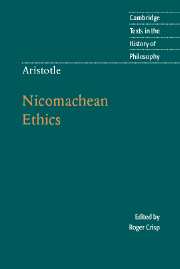Book IV
from Nicomachean Ethics
Summary
Next let us discuss generosity. It seems to be the mean in relation to wealth: the generous person is praised not in matters of war, nor in those that concern the temperate person, nor again in respect of his legal judgements, but rather with regard to the taking and giving of wealth, and more especially the giving. By wealth, I mean everything the value of which is measured in money.
Both wastefulness and stinginess are also excesses and deficiencies with regard to money. We always ascribe stinginess to people who take wealth more seriously than they should, but we sometimes use the term ‘wasteful’ with a wider connotation, calling wasteful those who are incontinent and spend their money on intemperate pursuits. These incontinent people are therefore thought to be the worst of characters, because they possess several vices at the same time. But this means they are not properly called wasteful, since ‘wasteful’ means a person with one vice, namely, that of wasting his property. This is because a wasteful person – one who is asōtos, ‘not saved’ – is a person who ruins himself, and the wasting of one's property seems to be a kind of ruining of oneself, since living depends on it. This, then, is how we understand wastefulness.
Things that have a use can be used both well and badly. Riches are among the things that can be used; and each thing is used best by the person with the relevant virtue.
- Type
- Chapter
- Information
- Aristotle: Nicomachean Ethics , pp. 60 - 80Publisher: Cambridge University PressPrint publication year: 2000
- 3
- Cited by



